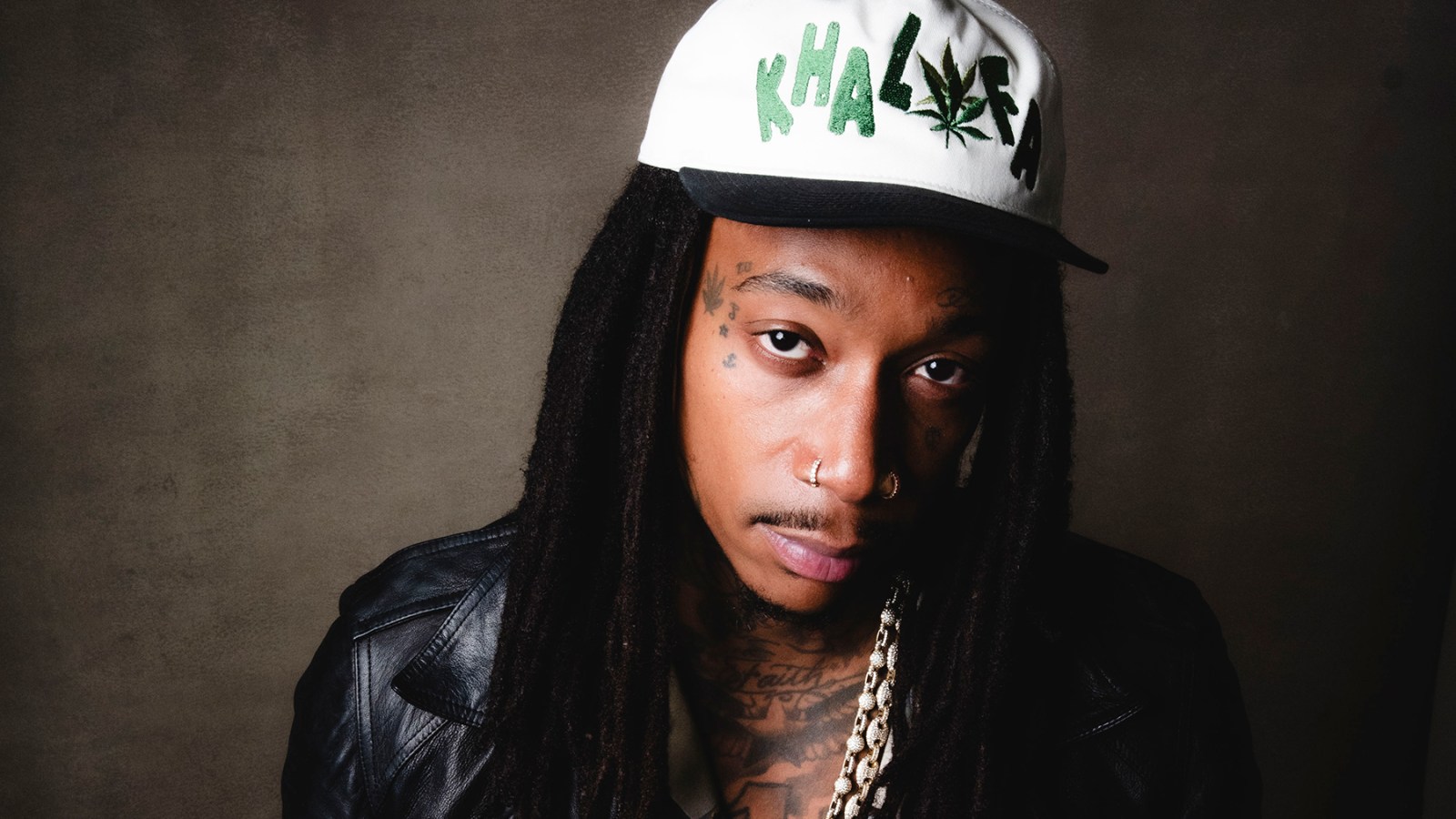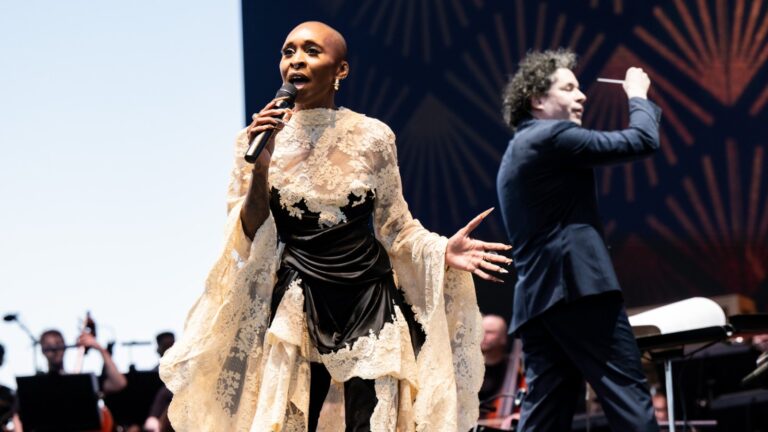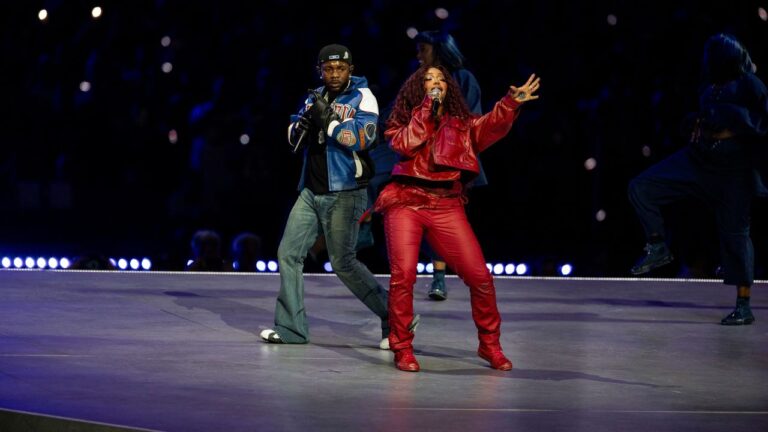When Wiz Khalifa arrives at the Rolling Stone offices the day before the release of Kush + Orange Juice 2, the sequel to his cult classic 2010 mixtape, he wastes no time getting right into the music. With a discography full of smash hits, Wiz’s career stands alongside legends of the genre, yet he possesses a workman’s humility. He says he decided to release this new project primarily in service of fans who’ve been clamoring for it on social media for years. For Wiz, it all comes back to his actual supporters.
“It’s what got me to where I’m at in a time when labels didn’t understand me, it was up to them to create the narratives,” he says. “My fans are the ones who stepped up and told people who I am and made sure that they spread the word about me.”
Hailing from the oft-overlooked Pittsburgh, Wiz came into the rap game on the internet-driven wave of the early 2010s, a time when independent acts started to break down the barriers of major labels and radio, building their own movements. His sound — breezy, laid-back stoner raps — jelled effortlessly with the newly malleable pop landscape of the blog era. The first Kush and Orange Juice came just as Wiz’s star was beginning to rise, right ahead of his chart-topping hometown anthem “Black and Yellow,” which took the country by storm and introduced the mainstream to Wiz’s distinct movement.
Since then, he’s had an enviably self-contained career, making the kinds of moves that make the most sense for him, with little fealty to trends or waves in music. He talked to Rolling Stone about his new mixtape, the key to longevity, and why we need to bring weed back to the forefront of rap.
I feel like with you coming up, that was a big moment for independent artists too, and I think that’s something that stuck with your career.
Yeah, I think the game was changing when we came up because you had signed acts who were successful, but there was the machine, and then you had the internet, which was, we were cool, and the kids were cool. They don’t want the machine. So while the signed acts were selling, they weren’t as cool as us, and what we represented was that freedom, that coolness, that underground, that discovery stage, and a lot of fun stuff happened to our music. So it created a lot of good memories for people, too.
This record has a distinct sound that’s reminiscent of the first mixtape, but also feels like it sounds significantly different from what everyone else is doing right now. Did you go back to a lot of the same producers?
People are saying that they missed that sound. And for me, it’s perfect timing because I am at a point where I could just entertain the people that I want to. It’s only me and my career. So for this, I do have a lot more freedom and a lot more say so as far as how everything goes. It’s just an all-around Wiz Khalifa production. I went back to the exact same people. Cardo, Sledgren. I added Problem, DJ Quik, Mike & Keys. But really, it’s all just based on that [original] team, what I know the fans want to hear, and the pocket that I’m able to get in that satisfies that.
How have you been able to maintain that relationship with some of those people?
I think it just works like that. The people who I’m cool with and who I worked with back then are the same people who I’m cool with and work with now. We all have each other’s numbers. We all pretty much do the same stuff. I’ve achieved what I’ve achieved on a major label scale, but that doesn’t change my core and what I, and I still practice all the time and my homies still practice all the time too. So it’s nothing for us to get in there and really let motherfuckers have it and it sound good.
You’ve been recording it since basically May last year. What were some of those early sessions like? When you first started to really say, all right, we’re going to go back and do this?
They were crazy. It was definitely a little bit different. I started with just instruments, and I built it literally from the ground up. I would start with one or two instruments, and I started just playing with different flows and different cadences and just messing with my voice, trying to get my subject matter together. And then I started adding drums in different grooves on top of it to try to figure out what I wanted it to sound like and what was sonically going to be the best for the next generation of fans. And the original stuff that I was coming up with, it was cool, but it was something that led me to figure out later that pocket and what that sound actually was like. So I had to go through months of just playing with different records and thinking that some songs would fit, and thinking that certain songs would be different moments, but having to pivot and change my writing style or call different producers to add different elements that I wouldn’t get anywhere else. So it was a real process just putting it all together.
Do you find yourself still getting just creatively inspired on your own?
I do. I’m always getting inspired. I have different modes of inspiration. For months, I would just put on records and listen to jazz music or rock and roll from different countries, or just discover older American artists. And then sometimes I’ll just listen to older rap music that inspired me when I was younger. And then sometimes I’ll listen to all new shit and sometimes I’ll listen to freaking electronic music, whatever it is. I just get in different pockets and they inspire me to do different things that are still identifiable to me at the time because I can’t never really be one of those artists, but to just tap into what makes them think or even just learn about different song structures or what’s expected from different genres and things like that, it helps me approach my music a little bit differently and a little bit better.
There’s the track “Red Eye” that has a Jamaican dub kind of sound, and I feel like you found a new kind of flow over those drums.
Problem had sent me a pack from Mike and Keys that they were working on, and we had found a new way to make these sounds that we were trying to make because we were bringing in live bands and doing all types of shit, which was cool. It sounded good, but we were trying to get around sampling, and we still wanted to get that soulful sound.
So we figured out some different stuff to do, and he just sent me a pack of beats, and that was one that I laid the verse on it at first, and nobody was even there. It was just me. And I laid the verse on it and I had it for two weeks, and then I just played it back and I’m like, damn, I just thought it was going to be a freestyle or something like that. But just in those two weeks, I don’t know what I went through, but I was able to come up with a hook, another verse, and finish the song off. It was so good. And then when I listened back to it, I was like, damn, this song is crazy. So it wasn’t even really intentional. It was just something that came together and then in the end it was just fire as fuck
What kind of maturity do you see between the first project and this one?
I see tons of maturity. I’m less disrespectful towards women. I definitely talk way more about my kids, and just my description of a perfect day back then is totally different from my description of a perfect day now, but it’s still cool. And that’s the thing that I love about it, I’m able to speak on my reality, but still in a way that somebody who wants to be cool is going to look up to it. It’s very positive. It is super duper positive. That’s where I’m at in my mind. I do a lot of yoga. I work out and practice martial arts, so I’m a different person. I’m really happy that I don’t have to compromise that to create music that resonates with my older fans.
How have you been able to watch the industry and the way people make music? It seems like you’re able to do your own thing.
Yeah, I think I’ve just been fearless and unapologetic, and that’s, that works for me. I enjoy it. And my fans have been holding me down for a lot of years, and they don’t always agree with what I do, but I’m still here. I guess I’m doing something right. And that’s the thing about art is it is not supposed to be linear. I think anybody whose path is just straight to the top, and then it’s just like you’re just there. You’re just perfect. There’s a lot more to it than you actually see. So, for me, I think you get what you see, and it is real, it’s reality. It is just a true art form. It’s a business. And I know that it changes a lot, but the main thing that always stays the same is that whoever has the strongest connection with their fans is going to win. So it doesn’t matter what machine is behind you, what type of music you make, how old you are, or what color you are. If you have a connection with your fan base, then you’re going to win. And I love that. I love that about music because anybody can come out of their basement and come up with some lingo, start dressing a certain way, start releasing consistently, and they’re on their way.
A few months ago, I think I saw you on the Plaqueboymax stream, and I feel like that world is similar, where it’s all about that direct connection to your people.
They are directly connected, and those kids work hard. So nobody can take that away from them, no matter what. I feel like a lot of people try to discredit them and say that they don’t have any taste or that they shouldn’t be taste makers these days, but they work hard. They’re working every day; they’re working several times a day. They have teams behind them that they manage as well. You couldn’t get a handful of rappers to do that. They want somebody else to do everything else for ’em, and they just want to sit, drink lean, and be in the studio. Them kids ain’t doing that. That’s why they’re busting everybody ass.
You arrived as the internet was beginning to transform things. What’s it been like for you to see, over the past several years, how the internet has completely changed music and especially hip hop?
Yeah, I think it’s just reminiscent of what we started, because we started on Twitter, and it was a free-for-all at that point. Nothing was monetized or any of that on YouTube as well. And now it’s just all about breaking the system, whoever can break the system, and do it in a way where the higher-ups have to acknowledge you. It’s the same exact concept. It is just different apps and technology. But it’s the same concept, though.
You’ve got a Max B feature on the project. He got locked up around the time you were just getting started. How did y’all link up?
I didn’t know him way back. I think our relationship just started from me acknowledging him and saying how much I like his music, and saying how much he inspires me. And his lawyers and legal team started reaching out, and just through that, we were able to connect on the phone and just have a back and forth.
Did you initially ask him to provide a verse for this record, or was it just for anything?
Oh yeah. I asked him for the verse. I was like, man, I need you. I’m on Kush + Orange Juice 2. I’m building this up. And like I said, the original stuff didn’t even have beats to it or none of that, so I was just like, I don’t know, even though what the song’s going to sound like, so just send me a verse and then I’m going to build off of that and make it into what we think it should be.
When you were putting together who was going to be included on the record, what were you thinking about?
Really just voices and roles, kind of like in a movie. But on this album, it’s kind of like how Dr. Dre’s album The Chronic, the people that are a part of it are as important as the music. It’s not like I’m reaching out so far outside of my orbit. It’s like a barbecue or a car meetup. So it’s like all of these people are needed for the sound. It’s not even just their name. What they do is needed to make the sound as rich as possible. It’s like seasoning.
I feel like one of the things that’s cool about this project is that it brings back the era of weed being at the forefront of hip hop. As rap’s foremost stoner, what’s it like to see the game get into harder drugs?
It is sad and it sucks to see him get into harder drugs because that’s not a lifestyle that you could sustain. You could sustain being a pothead and having a great time, or you could smoke less weed, just a little bit of weed, or only smoke weed on occasion. When you want to listen to Kush + Orange Juice 2, I don’t want to turn everybody into it, but the lifestyle that comes with it is way more livable than the weed, than the other drugs that people are doing. And those people really aren’t having fun. The amount of violence, the amount of just shit that you have to worry about when you’re in that crowd, it doesn’t even compare to just being around some cool stoners and enjoying yourself. So I’m just giving people an alternative and really, like you said, bringing that to the forefront and making that cooler to just chill out and be alive,



